- Clone
- MAb-CC1 (See other available formats)
- Regulatory Status
- RUO
- Other Names
- CEACAM1a, Bgp
- Isotype
- Mouse IgG1, κ
- Ave. Rating
- Submit a Review
- Product Citations
- 1 publications
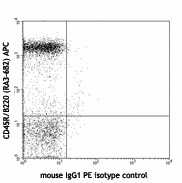
-

Balb/c mouse splenocytes stained with MAb-CC1 PE (lower panel) or mouse IgG1 PE isotype control (upper panel) and CD45R/B220 (RA3-6B2) APC. -

| Cat # | Size | Price | Quantity Check Availability | Save | ||
|---|---|---|---|---|---|---|
| 134533 | 100 µg | 150€ | ||||
| 134534 | 1 mg | 595€ | ||||
CD66a, known as CEACAM1a, carcinoembryonic antigen-related cell adhesion molecule 1a, is a glycoprotein of the immunoglobulin superfamily and the carcinoembryonic antigen family. Isoforms expressing either two or four alternatively spliced Ig-like domains in mice have been found in a number of epithelial, endothelial, or hematopoietic tissues. CEACAM1a functions as an intercellular adhesion molecule, an angiogenic factor, and a tumor cell growth inhibitor. It also serves as a signal regulatory protein influencing B cell receptor complex-mediated activation. The mouse and human CEACAM1a proteins are targets of viral or bacterial pathogens, respectively. It was reported that targeted disruption of the CEACAM1a gene resulting in a partial ablation of the protein in mice led to reduced susceptibility to virus infection. The antibody recognizes the N-terminal domain of murine CEACAM1a, it does not recognize murine CEACAM1b, an allele in SJL mice.
Product DetailsProduct Details
- Verified Reactivity
- Mouse
- Antibody Type
- Monoclonal
- Host Species
- Mouse
- Immunogen
- SJL/J mice immunized with deoxycholate extracted proteins from BALB/c intestinal brush border membranes.
- Formulation
- 0.2 µm filtered in phosphate-buffered solution, pH 7.2, containing no preservative.
- Endotoxin Level
- Less than 0.01 EU/µg of the protein (< 0.001 ng/µg of the protein) as determined by the LAL test.
- Preparation
- The Ultra-LEAF™ (Low Endotoxin, Azide-Free) antibody was purified by affinity chromatography.
- Concentration
- The antibody is bottled at the concentration indicated on the vial, typically between 2 mg/mL and 3 mg/mL. Older lots may have also been bottled at 1 mg/mL. To obtain lot-specific concentration and expiration, please enter the lot number in our Certificate of Analysis online tool.
- Storage & Handling
- The antibody solution should be stored undiluted between 2°C and 8°C. This Ultra-LEAF™ solution contains no preservative; handle under aseptic conditions.
- Application
-
FC - Quality tested
IHC-F - Reported in the literature, not verified in house - Recommended Usage
-
Each lot of this antibody is quality control tested by immunofluorescent staining with flow cytometric analysis. For flow cytometric staining, the suggested use of this reagent is ≤ 0.25 µg per million cells in 100 µl volume. It is recommended that the reagent be titrated for optimal performance for each application.
- Application Notes
-
Mab-CC1 clone recognizes the MHV binding domain of CD66a2. Pretreatment of murine fibroblasts with Mab-CC1 prevented binding of MHV-A59 and protected cells from infection with MHV-A592. SJL/J mice are resistant to MHV as they express an alternative allele, clone Mab-CC1 does not react against SJL/J cells2.
-
Application References
(PubMed link indicates BioLegend citation) -
- Turner BC, et al. 2004. J. Virol. 78 (10):5486
- Williams RK, et al. 1990. J. Virol. 64:3817
- Dveksler GS, et al. 1993. Proc. Natl. Acad. Sci. USA. 90:1716
- Product Citations
-
- RRID
-
AB_2810401 (BioLegend Cat. No. 134533)
AB_2810401 (BioLegend Cat. No. 134534)
Antigen Details
- Structure
- A glycoprotein of the immunoglobulin (Ig) superfamily and the carcinoembryonic antigen family
- Distribution
-
CEACAM1a is abundantly expressed on B cells, granulocytes, some NK cells, monocytes, DCs, and NK cells. It is found on epithelial and endothelial cells.
- Function
- CEACAM1a is involved in cell adhesion, tumor growth, and viral infection. It regulates on BCR activation of B lymphocytes.
- Cell Type
- B cells, Dendritic cells, Endothelial cells, Epithelial cells, Granulocytes, Monocytes, NK cells
- Biology Area
- Immunology
- Molecular Family
- Adhesion Molecules, CD Molecules
- Antigen References
-
1. Nakagaki K, et al. 2005. J. Virol. 79(10):6102
2. Greicius G et al. 2003. J. Leukoc. Biol. 74(1):126
3. Hemmila E et al. 2004. J. Virol. 78(18):10156 - Gene ID
- 26365 View all products for this Gene ID
- UniProt
- View information about CD66a on UniProt.org
Related Pages & Pathways
Pages
Related FAQs
- Do you guarantee that your antibodies are totally pathogen free?
-
BioLegend does not test for pathogens in-house aside from the GoInVivo™ product line. However, upon request, this can be tested on a custom basis with an outside, independent laboratory.
- Does BioLegend test each Ultra-LEAF™ antibody by functional assay?
-
No, BioLegend does not test Ultra-LEAF™ antibodies by functional assays unless otherwise indicated. Due to the possible complexities and variations of uses of biofunctional antibodies in different assays and because of the large product portfolio, BioLegend does not currently perform functional assays as a routine QC for the antibodies. However, we do provide references in which the antibodies were used for functional assays and we do perform QC to verify the specificity and quality of the antibody based on our strict specification criteria.
- Does BioLegend test each Ultra-LEAF™ antibody for potential pathogens?
-
No, BioLegend does not test for pathogens in-house unless otherwise indicated. However, we can recommend an outside vendor to perform this testing as needed.
- Have you tested this Ultra-LEAF™ antibody for in vivo or in vitro applications?
-
We don't test our antibodies for in vivo or in vitro applications unless otherwise indicated. Depending on the product, the TDS may describe literature supporting usage of a particular product for bioassay. It may be best to further consult the literature to find clone specific information.
Other Formats
View All CD66a (CEACAM1a) Reagents Request Custom Conjugation| Description | Clone | Applications |
|---|---|---|
| PE anti-mouse CD66a (CEACAM1a) | MAb-CC1 | FC |
| APC anti-mouse CD66a (CEACAM1a) | MAb-CC1 | FC |
| PE/Cyanine7 anti-mouse CD66a (CEACAM1a) | MAb-CC1 | FC |
| FITC anti-mouse CD66a (CEACAM1a) | MAb-CC1 | FC |
| PerCP/Cyanine5.5 anti-mouse CD66a (CEACAM1a) | MAb-CC1 | FC |
| Alexa Fluor® 488 anti-mouse CD66a (CEACAM1a) | MAb-CC1 | FC |
| Alexa Fluor® 647 anti-mouse CD66a (CEACAM1a) | MAb-CC1 | FC |
| Purified anti-mouse CD66a (CEACAM1a) | MAb-CC1 | FC,IHC-F |
| Brilliant Violet 421™ anti-mouse CD66a (CEACAM1a) | MAb-CC1 | FC |
| Brilliant Violet 650™ anti-mouse CD66a (CEACAM1a) | MAb-CC1 | FC |
| Ultra-LEAF™ Purified anti-mouse CD66a (CEACAM1a) | MAb-CC1 | FC,IHC-F |
| APC/Cyanine7 anti-mouse CD66a (CEACAM1a) | MAb-CC1 | FC |
| Spark Blue™ 550 anti-mouse CD66a (CEACAM1a) (Flexi-Fluor™) | MAb-CC1 | FC |
| Spark Blue™ 574 anti-mouse CD66a (CEACAM1a) (Flexi-Fluor™) Antibody | MAb-CC1 | FC |
| Spark Red™ 718 anti-mouse CD66a (CEACAM1a) (Flexi-Fluor™) | MAb-CC1 | FC |
Compare Data Across All Formats
This data display is provided for general comparisons between formats.
Your actual data may vary due to variations in samples, target cells, instruments and their settings, staining conditions, and other factors.
If you need assistance with selecting the best format contact our expert technical support team.
-
PE anti-mouse CD66a (CEACAM1a)
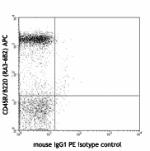
Balb/c mouse splenocytes stained with MAb-CC1 PE (lower pane... 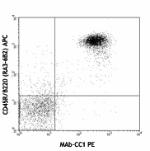
-
APC anti-mouse CD66a (CEACAM1a)
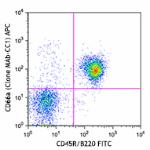
C57BL/6 mouse splenocytes were stained with CD45R/B220 FITC ... 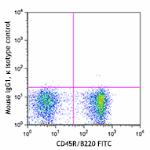
-
PE/Cyanine7 anti-mouse CD66a (CEACAM1a)

C57BL/6 mouse splenocytes were stained with CD45R/B220 FITC ... -
FITC anti-mouse CD66a (CEACAM1a)
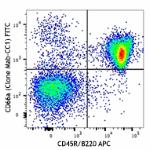
C57BL/6 mouse splenocytes were stained with CD45R/B220 APC a... 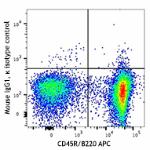
-
PerCP/Cyanine5.5 anti-mouse CD66a (CEACAM1a)

C57BL/6 mouse splenocytes were stained with CD45R/B220 Alexa... -
Alexa Fluor® 488 anti-mouse CD66a (CEACAM1a)
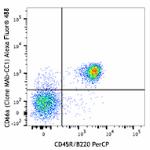
C57BL/6 mouse splenocytes were stained with CD45R/B220 PerCP... 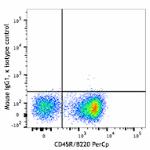
-
Alexa Fluor® 647 anti-mouse CD66a (CEACAM1a)
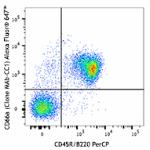
C57BL/6 mouse splenocytes were stained with CD45R/B220 PerCP... 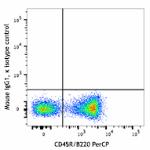
-
Purified anti-mouse CD66a (CEACAM1a)
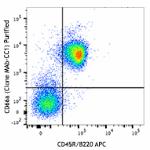
C57BL/6 mouse splenocytes were stained with CD45R/B220 APC a... -
Brilliant Violet 421™ anti-mouse CD66a (CEACAM1a)
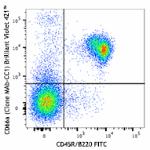
C57BL/6 mouse splenocytes were stained with CD45R/B220 FITC ... 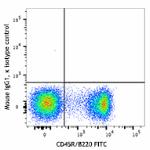
-
Brilliant Violet 650™ anti-mouse CD66a (CEACAM1a)
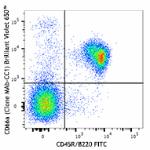
C57BL/6 mouse splenocytes were stained with CD45R/B220 FITC ... 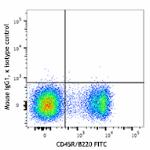
-
Ultra-LEAF™ Purified anti-mouse CD66a (CEACAM1a)

Balb/c mouse splenocytes stained with MAb-CC1 PE (lower pane... 
-
APC/Cyanine7 anti-mouse CD66a (CEACAM1a)

C57BL/6 mouse splenocytes were stained with CD45R/B220 PE an... -
Spark Blue™ 550 anti-mouse CD66a (CEACAM1a) (Flexi-Fluor™)
-
Spark Blue™ 574 anti-mouse CD66a (CEACAM1a) (Flexi-Fluor™) Antibody
-
Spark Red™ 718 anti-mouse CD66a (CEACAM1a) (Flexi-Fluor™)

 Login / Register
Login / Register 









Follow Us